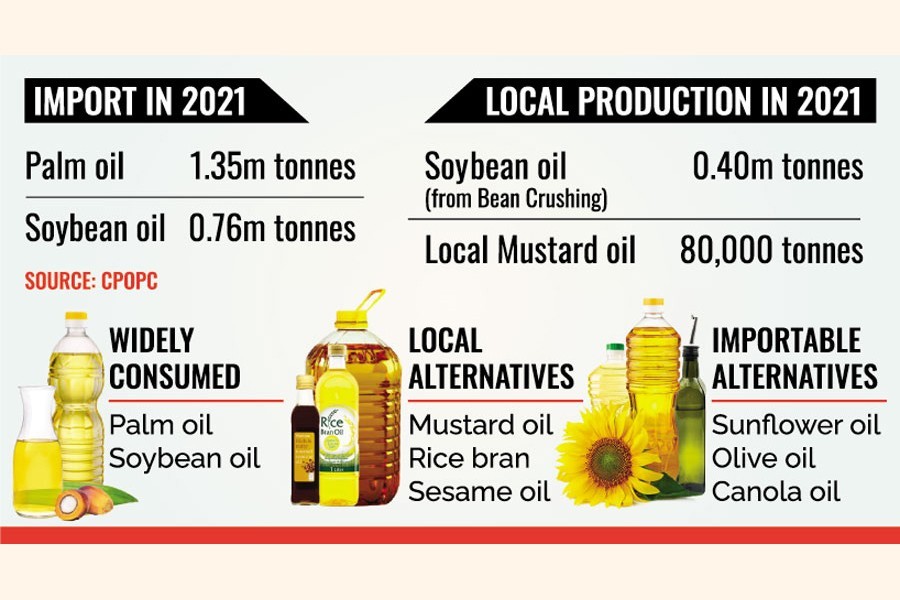Bangladesh Trade and Tariff Commission (BTTC) suggests cuts in taxes on sunflower, olive and canola oils to help dilute dependence on widely consumed soybean and palm oils.
Sunflower, olive and canola oils are expensive in Bangladesh because of higher duty and taxes and tariff value and those are usually consumed by the affluent section of society.
The BTTC recommends rationalising the import duties on the 'expensive' edible oils in line with the exemptions offered to soyabean and palm oils, as a fiscal solution to the market overheating.
In an official correspondence to the Ministry of Commerce, the BTTC has proposed cuts in duties and taxes on sunflower, olive, and canola oils in the upcoming budget for fiscal year 2022-23.
The Commission feels that a cut in dependence is necessary due to volatile price situation of soybean and palm oils on the international market and resultant high rates at home.
Edible-oil prices have skyrocketed in the local markets in recent months because of supply crunch and the rise in their international prices. Allegations are rife that a section of unscrupulous traders have hiked the prices of edible oils taking advantage of the situation.
A sudden decision of Indonesia to impose ban on palm-oil export has created deep worries, in the meantime. Palm oil has a 65-percent share in the domestic edible-oil market and soybean 31 per cent. About 87 per cent of palm oil is sourced from Indonesia.
In its letter to the MoC, the BTTC said higher duties and taxes on sunflower, olive and canola have been discouraging their imports. Only 1600 tonnes of other types of edible oils were imported in 2019-20 paying Tk 88.5 million in taxes. The annual oil consumption is estimated at 2.5 million tonnes
BTTC assistant chief Mahmodul Hassan says the alternative edible oils have to be popularized by bringing down its import duties and taxes.
"The volatile market of edible oils and supply crunch could be checked by making other types of edible oils available in the local market at affordable prices," he says.
Consumers have rights to shift to other types of edible oils and there would be diversity in the local market, he adds.
Major share of edible-oil consumption is grabbed by soybean and palm oils. Around 95 per cent of the local demand for edible oils is met through imports.
Currently, import of edible oils, other than soyabean and palm, is subject to high duties and taxes along with minimum tariff value.
Rape or canola oil (low uric acid) is popular edible oil worldwide and that is subject to paying a total of 37-percent duty.
Import of refined sunflower oil required to pay 32-percent tax including 10- percent Customs Duty (CD), 15-percent VAT, 5.0-per cent Advance Tax (AT) and a tariff value US$ 1.6 per kilogram.
The total duties and taxes on imported crude sunflower oil come to 31 per cent.
The BTTC proposed to bring down its Total Tax Incidence (TTI) to 20 per cent for both refined and crude sunflower oils.
The BTTC proposal says sunflower, refined olive oil and canola oils have less saturated fat and are often prescribed by physicians for health issues.
Most oil refineries refine palm and soyabean crude.
There is no import-tax benefit for refined soybean and palm oils.
A number of supplier countries of soyabean have increased export duty on crude soyabean oil following supply shortage of the item.
Currently, TTI on refined and crude olive oils is 37 per cent, olive oil wrapped or canned 58.60 per cent, BTTC data showed.
The BTTC recommended bringing down it to 25 per cent and 31 per cent respectively.
In March last, the National Board of Revenue (NBR) cut taxes on soyabean oil and palm oil to 5.0 per cent, waiving its 15-per cent VAT on oil refining, 5.0 per cent at trading stage and 15 per cent at import stages.
The supply of vegetable oil has faced a blow globally since 2021 due for several reasons, including worker shortage, production fall and freight disruption due to the Covid-19 pandemic.
However, supply of sunflower oil has been facing supply disruption due to the Russia-Ukraine war.
Knowledgeable circles, however, expressed surprise over the BTTC suggestion to reduce dependence on palm and soyabean oils by cutting duty and taxes on sunflower, olive and canola oils.
They felt that appropriate alternatives would be mustard and rice-bran oils. The government may offer fiscal incentives to these oils to help cut their prices. The imported mustard crude is subjected to 37-per cent duty and taxes and refined 58 per cent.
doulot_akter@yahoo.com


